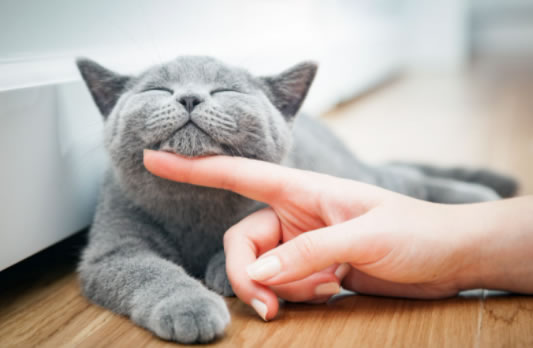


Well, of course we would start here! Cats need a meat-based diet to meet all their nutritional requirements. Our Adult Cat Mousse is grain free and contains 80% high quality meat, with added Taurine for normal heart function and vision. Cats prefer to eat little and often throughout the day, rather than large meals. They will also be more likely to eat their meals if their bowl is not too close to their litter box – for obvious reasons!
Ensure fresh drinking water is available to them readily throughout the day. If you notice any changes in their eating habits, consult with your vet straight away for any underlying illness they may have.
Cats are naturally active and need an outlet for their energy. If you choose to have a house cat, read our blog here about how you can keep them physically and mentally active indoors. If you have a cat who enjoys the outdoors, it is equally important for them to get mental stimulation indoors through play time with you and exciting toys!
Cats are independent hunters, and when outdoors will typically spend 6-8 hours prowling around. It is important to check them regularly for any injuries they may get from their outside antics, either from hedges, fences, or other cats they may have been playfully, or not so playfully fighting with.
Look at their paws for anything they may have stepped on too. It is advisable to wipe them each time they come in during the Winter months to remove any grit and dampness they have encountered. If it is too cold, keep them inside!

Cats are naturally active creatures
Cats are very clean creatures and expect a certain high standard of cleanliness from their humans. This means a regularly emptied litter box (or they may choose to go somewhere else to remind you to clean it!), a clean eating area and regular washing of their food and water bowls.
Whilst they regularly groom themselves, it is important that we help them out with regular brushing (especially with a long-haired cat), and dental care. Consult your vet on the best approach for undertaking dental care at home – note, never use human toothpaste as this is toxic to our cats!
Watching your cat’s grooming habits can also help indicate if they need to be checked over by your vet, if they are licking or chewing at a particular area. These could be possible skin problems, allergies or even the presence of a creepy crawly.

Not all cats may love being brushed like this - so ease them in and train them to enjoy the pampering!
As we mentioned before, they are notoriously independent creatures. Providing a safe, quiet place for them to retreat to is so important for your cat to have as their own and to go to if they feel stressed or threatened. In this area there should be clean bedding, and it should be accessed by them easily.
This list is not exhaustive, but a good starting place to make sure we all have happy and healthy cats in our home! You may also be interested in reading our other blog, about what your cat’s tail is telling you.